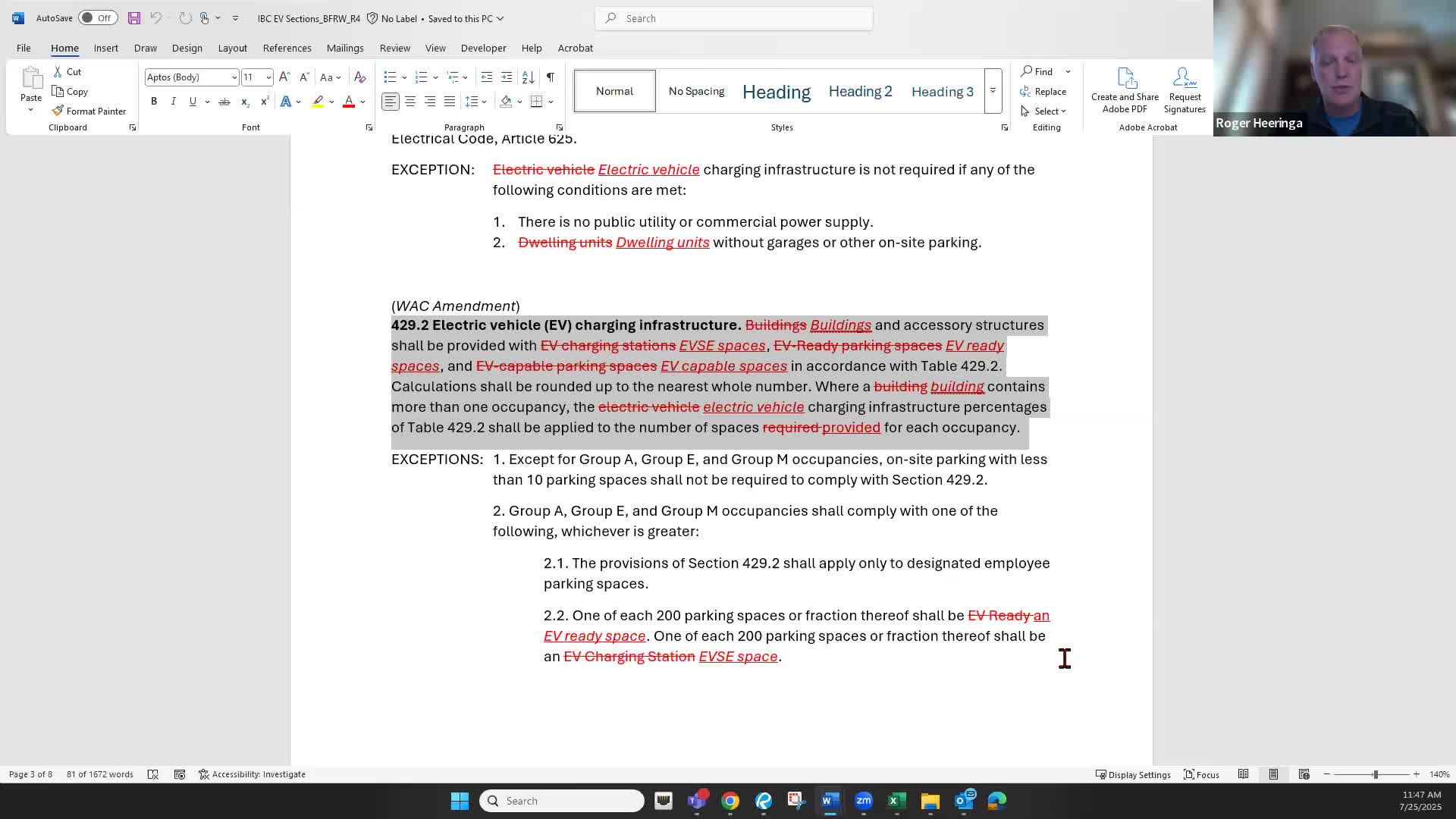Washington Council Debates EV Charging Infrastructure Requirements and Power Supply Concerns
July 31, 2025 | Building Code Council, Governor's Office - Boards & Commissions, Executive, Washington
This article was created by AI summarizing key points discussed. AI makes mistakes, so for full details and context, please refer to the video of the full meeting. Please report any errors so we can fix them. Report an error »

The SBCC Council Meeting held on July 25, 2025, focused on discussions surrounding electric vehicle (EV) charging infrastructure and its implications for building codes in Washington. The meeting, attended by various stakeholders, aimed to address the evolving needs for EV readiness in new developments while balancing costs and regulatory requirements.
The meeting commenced with a review of proposed changes to the building code regarding EV charging stations. Council members expressed concerns about the adequacy of current infrastructure to support the anticipated increase in EV usage. A key point of discussion was whether the proposed code changes would ensure sufficient EV-ready spaces in new developments, particularly in areas lacking public utility access.
Council member Schmidt raised questions about the criteria for determining the availability of power supply in rural areas, emphasizing the need for clarity on how the code would assess the capacity of the grid to meet future demands. The discussion highlighted the importance of aligning the code with legislative intent while considering public feedback during the review process.
Roger, a council member, acknowledged the complexities involved in the proposed changes, noting that the committee aimed to create a more user-friendly version of the code. He emphasized the need for ongoing public comment to refine the proposal further.
The council also discussed the financial implications of the proposed changes, with some members expressing concerns about the costs associated with installing EV charging infrastructure. Scott, another council member, pointed out that while he supports EV adoption, the financial burden on developers and the speculative nature of future EV usage must be carefully considered. He questioned whether the market should dictate the installation of charging stations rather than imposing mandates through code changes.
In response, other members highlighted the necessity of planning for future EV infrastructure, arguing that proactive measures would ultimately benefit consumers and reduce operational costs in the long run. The conversation underscored the tension between immediate costs and long-term benefits, with various stakeholders advocating for a balanced approach.
Public comments during the meeting reflected a mix of support and opposition to the proposed changes. Patrick Hanks from the Building Industry Association praised the collaborative efforts of the committee while also noting the need to address cost burdens for housing affordability. Conversely, representatives from King County expressed concerns that the proposed changes could weaken existing requirements, potentially hindering Washington's progress in EV adoption.
As the meeting concluded, the council agreed to move forward with the proposal for public comment, allowing for further input from stakeholders before finalizing any changes. The discussions highlighted the ongoing challenges of integrating EV infrastructure into building codes while ensuring that developments remain economically viable and environmentally responsible. The council plans to continue engaging with the public and stakeholders as they refine the proposal in the coming months.
The meeting commenced with a review of proposed changes to the building code regarding EV charging stations. Council members expressed concerns about the adequacy of current infrastructure to support the anticipated increase in EV usage. A key point of discussion was whether the proposed code changes would ensure sufficient EV-ready spaces in new developments, particularly in areas lacking public utility access.
Council member Schmidt raised questions about the criteria for determining the availability of power supply in rural areas, emphasizing the need for clarity on how the code would assess the capacity of the grid to meet future demands. The discussion highlighted the importance of aligning the code with legislative intent while considering public feedback during the review process.
Roger, a council member, acknowledged the complexities involved in the proposed changes, noting that the committee aimed to create a more user-friendly version of the code. He emphasized the need for ongoing public comment to refine the proposal further.
The council also discussed the financial implications of the proposed changes, with some members expressing concerns about the costs associated with installing EV charging infrastructure. Scott, another council member, pointed out that while he supports EV adoption, the financial burden on developers and the speculative nature of future EV usage must be carefully considered. He questioned whether the market should dictate the installation of charging stations rather than imposing mandates through code changes.
In response, other members highlighted the necessity of planning for future EV infrastructure, arguing that proactive measures would ultimately benefit consumers and reduce operational costs in the long run. The conversation underscored the tension between immediate costs and long-term benefits, with various stakeholders advocating for a balanced approach.
Public comments during the meeting reflected a mix of support and opposition to the proposed changes. Patrick Hanks from the Building Industry Association praised the collaborative efforts of the committee while also noting the need to address cost burdens for housing affordability. Conversely, representatives from King County expressed concerns that the proposed changes could weaken existing requirements, potentially hindering Washington's progress in EV adoption.
As the meeting concluded, the council agreed to move forward with the proposal for public comment, allowing for further input from stakeholders before finalizing any changes. The discussions highlighted the ongoing challenges of integrating EV infrastructure into building codes while ensuring that developments remain economically viable and environmentally responsible. The council plans to continue engaging with the public and stakeholders as they refine the proposal in the coming months.
View full meeting
This article is based on a recent meeting—watch the full video and explore the complete transcript for deeper insights into the discussion.
View full meeting
